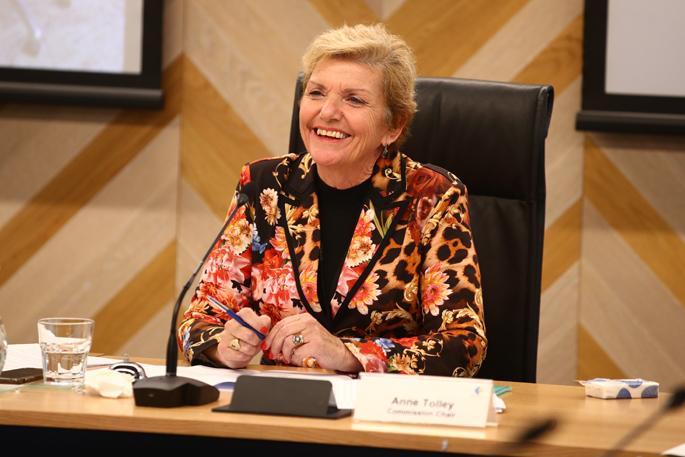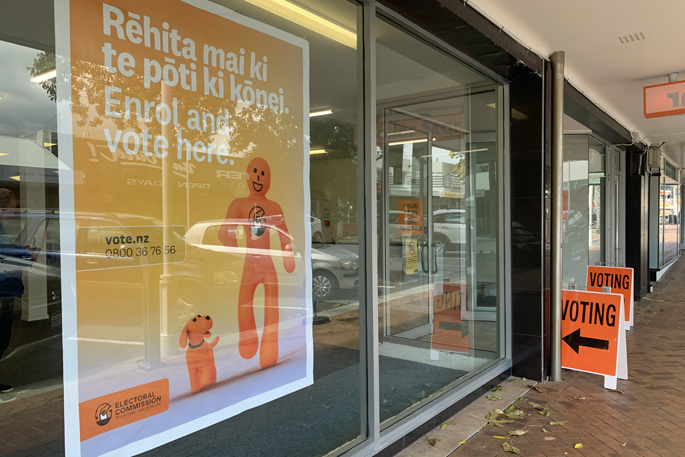Tauranga’s first elected council since 2019 will have an extended term of four years, which is being heralded as “great result” for the city.
An election will be held on July 20 where a mayor and nine councillors will be chosen, replacing the current commission.
This council will stay in place until the 2028 local elections, giving them a four year term. Standard electoral terms are three years and no other elected council in New Zealand has had an extended term.
Commission chair Anne Tolley says holding an election in Tauranga in October 2025 in line with the rest of the country would have required the election of two councils in 15 months.
“The commission’s view was that this was too short a timeframe for a council to make substantial progress with its work programme.
“The short turnaround between elections could potentially deter some candidates from seeking election this year, because they would have to go through the campaigning process, with the time commitment and costs that requires, twice in 15 months.”
The commission recommended the previous Minister of Local Government, Kieran McAnulty, that the 2025 election in Tauranga be deferred until 2028, says Tolley.
This was adopted and the decision was gazetted in August last year.
Local Government New Zealand president Sam Broughton says it is a “great result for Tauranga” to have an elected council that will be there for four years.
 Local Government New Zealand president Sam Broughton says a four year term doubles a council's productive years. Photo: Supplied.
Local Government New Zealand president Sam Broughton says a four year term doubles a council's productive years. Photo: Supplied.
A four year term provides stability and certainty for the delivery of projects, says Broughton.
“Being able to bring in the appropriate staff and to partner with other public and private sectors becomes a lot easier over four years.
“In three years, we basically have a year of settling, a year of doing some great mahi and a year of unsettling again, as you move towards an election.
“A four year term doubles the amount of productive years.”
Broughton wants the government to shift all local government terms to four years ahead of the October 2025 election.
The longer local government term could be a trial for the central government terms to be four years too, which would be a good move, he says.
“Moving the local government space is easier because the threshold for change is lower.”
Extending local government terms requires a law change but central government would involve a referendum and other things, says Broughton.
Asked if Tauranga would be a good test case, Broughton replied: “I don't want it to be a test. I want it to be the norm for local government.”
“It shows that the government has an appetite to have four year terms for local government”.
 Commission chair Anne Tolley supports four year terms for local and central government. Photo: John Borren/SunLive.
Commission chair Anne Tolley supports four year terms for local and central government. Photo: John Borren/SunLive.
Tolley also supports a four year term for central and local government because it provides the time needed to “get stuff done”.
Their thoughts are mirrored by the Future for Local Government review that suggested four year council terms as one of its 17 recommendations.
A panel spent two years reviewing the state of local government by speaking with councils, central government, iwi leaders and the public around Aotearoa.
It suggested a radical overhaul was needed to ensure local government adapted and met the needs of communities for the next 30 years.
A Department of Internal Affairs spokesperson says the postponement of the 2025 election allows the council elected in July time to build governance stability, while also engaging meaningfully with the community and the council’s strategy and long-term planning.
“Interventions in democratically elected councils are rare, and the transitions back unique.
“The department is not aware of another elected council that has served longer than a three-year term.”
Local Democracy Reporting asked Local Government Minister Simeon Brown his thoughts on the four year term.
Brown responded: “Restoring democracy in Tauranga is a priority for me as Minister of Local Government.”
Tauranga election key dates
Candidate information evening: Monday, 19 February
Nominations open: Friday, 26 April
Nominations close: Friday, 24 May at 12pm
Voting papers delivered: Saturday, 29 June – Wednesday 3 July
Special voting begins: Saturday, 29 June
Last day to enrol and be able to vote: Friday, 19 July
Election Day – voting closes: Saturday, 20 July at 12pm
Preliminary results announced Saturday, 20 July - afternoon
Final results out: Tuesday, 23 July – Thursday, 25 July
LDR is local body journalism co-funded by RNZ and NZ On Air.




8 comments
I Don't Care
Posted on 31-01-2024 17:58 | By Yadick
I don't care what the term is, just get these self centered, unelected commissioners out of our city. The sooner the better.
PLEASE, none of the old school stand that led us to where we are today.
Tauranga needs a complete fresh start, the commissioners ten year plan scrapped, and a Council of forward thinking achievers that listen and hear (2 immensely different things).
Don't take voting for granted and lightly. This is serious for Tauranga - OUR CITY.
So still no democracy
Posted on 31-01-2024 18:00 | By an_alias
How about we get a vote on this ?
Man there is no limit to these dictators it seems.
How about you step down NOW and we are sweet.
Heck its that simple but clearly agenda continues.
What a farce
Posted on 31-01-2024 18:05 | By Angels
This is supposed to be a democratic country. But when labor and mahuta in power they changed the dynamics . It’s discusting . Now we will have to pay the price for woke roads , spending etc. mahuta should be charged with something. Destroyed our city.
Meanwhile these
Posted on 01-02-2024 00:11 | By The Caveman
so called Commissioners that were appointed to run City on a "business as normal basis" have now committed the ratepayers to a BILLION $$$ of debt for the next 75 PLUS years !!
The Master
Posted on 01-02-2024 10:22 | By Ian Stevenson
The quality of decisions (Government or Councils) depends on the caliber of those elected and not how long they are there keeping a seat warm 24/7.
The TCC issue is that with 9 wards and no "at large" now, means the chances of an effective and competent group of Elected members being voted in is even more unlikely than before. The competence issue is clearly illustrated via the Commissioners words v's actions v's outcomes... an abysmal outcome by any measure.
Wards and commissioners need to go
Posted on 01-02-2024 11:13 | By Let's get real
The days of a ward system should be over... We are quite capable of deciding from the information provided, who is a competent and qualified professional and who is there to "give it a go"... With the ward system it is highly likely that we will get aggressive agitators with single agendas in council chambers, whilst possibly, multiple highly competent candidates go head to head against one another in a single ward and we lose not only a better representation but also hours of council time debating trivia.
Everyone should be there to represent the city in totality and not a single interest from one section of the whole.
Selfishness and self-interest have no place in a modern environment.
Bring in AT LARGE and let's see a council working for the city.
The Master
Posted on 01-02-2024 12:04 | By Ian Stevenson
@ Lets get real...
100% agree, however the Local Government commission in Wellington approved Mayor plus 9 wards. Meanwhile in Rotorua, they are all at large there. The decisions are flip-flopping all over the place.
What a mess it will be.
Lets Get It Right This Time!
Posted on 04-02-2024 09:01 | By Don Twori
One of the most urgent actions of the new government must surely be to review the mechanisms of local government. In both Tauranga and Gore we have had conflict between mayor and council members rendering themselves dysfunctional. This was the excuse the previous government used to completely dismantle the elected Tauranga council. This is surely an extreme act of throwing the baby out with the bathwater. We need a more effective mechanism to prevent such conflict.
Leave a Comment
You must be logged in to make a comment.